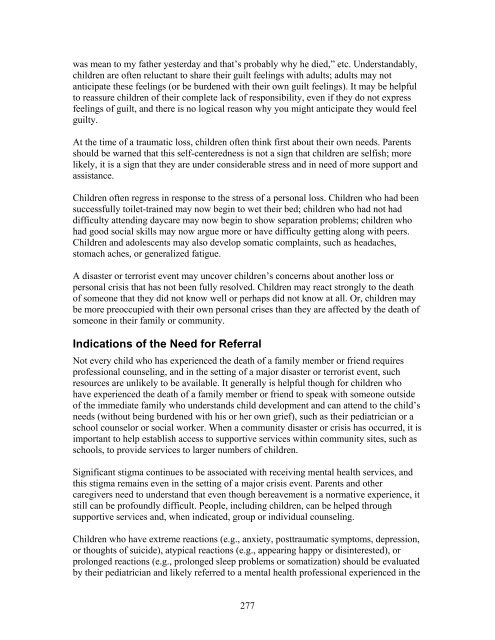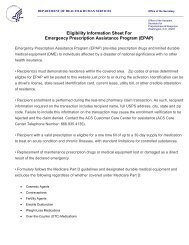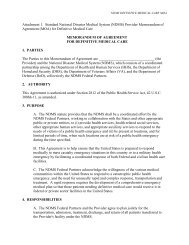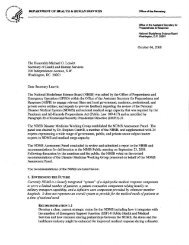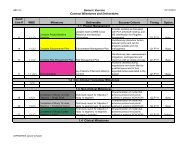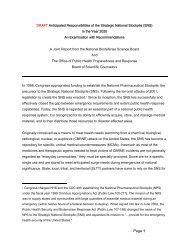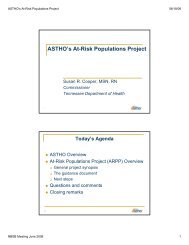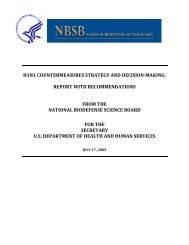- Page 1 and 2:
Bioterrorism and Other Public Healt
- Page 3 and 4:
Contents Chapter 1. Introduction ..
- Page 5 and 6:
Q Fever............................
- Page 7 and 8:
Basic Principles...................
- Page 9 and 10:
Chapter 9. Integrating Terrorism an
- Page 11 and 12:
Table 5.4 Nerve agent triage and do
- Page 13 and 14:
There are many gaps in knowledge, e
- Page 15 and 16:
injured or killed (see also Chapter
- Page 17 and 18:
Head injury is common in children.
- Page 19 and 20:
In situations of disaster, caregive
- Page 21 and 22:
maintaining and securing the airway
- Page 23 and 24:
• Schonfeld DJ. In times of crisi
- Page 26 and 27:
Types of Disasters Chapter 2. Syste
- Page 28 and 29:
problems noted above for flooding,
- Page 30 and 31:
Federal Response The United States
- Page 32 and 33:
The scope of ESF #8 is broad and in
- Page 34 and 35:
• Centers for Disease Control and
- Page 36:
Table 2.1 Types of disasters, hazar
- Page 39 and 40:
Medical staffs need to know what wi
- Page 41 and 42:
information, health and safety educ
- Page 43 and 44:
y private physicians. Approximately
- Page 45 and 46:
even required (particularly if a pe
- Page 47 and 48:
ICS structure is hierarchical. For
- Page 49 and 50:
• Provide community education so
- Page 51 and 52:
• Provide for crisis counseling.
- Page 53 and 54:
incident command officer is most of
- Page 55 and 56:
Figure 3.1 National Response Plan D
- Page 58 and 59:
Background History of Bioterrorism
- Page 60 and 61:
Epidemiology of a Terrorist Attack
- Page 62 and 63:
and may be watery, purulent, or blo
- Page 64 and 65:
fluid in these vesicles. A painless
- Page 66 and 67:
determined to be due to an agent of
- Page 68 and 69:
cared for using standard precaution
- Page 70 and 71:
may be providing longer term and mo
- Page 72 and 73:
The vaccine has a number of common
- Page 74 and 75:
Vaccination Large-scale vaccination
- Page 76 and 77:
cutaneous lesions; however, previou
- Page 78 and 79:
common food source is identified du
- Page 80 and 81:
treated people experience some degr
- Page 82 and 83:
treatment for plague meningitis. An
- Page 84 and 85:
Smallpox is spread most commonly in
- Page 86 and 87:
focal, intensely suppurative necros
- Page 88 and 89:
Control measures. Some viruses that
- Page 90 and 91:
Control measures. Person-to-person
- Page 92 and 93:
Signs and symptoms. The incubation
- Page 94 and 95:
currently used for individuals trav
- Page 96 and 97:
Accessed July 12, 2006. • Centers
- Page 98 and 99:
• Roffey R, Tegnell A, Elg HF. Bi
- Page 100 and 101:
Figure 4.2. Neurological signs, bot
- Page 102 and 103:
Figure 4.4. Physical distribution o
- Page 104 and 105:
Figure 4.6. Varicella lesions Note:
- Page 106 and 107:
Figure 4.8a. Febrile rash illness a
- Page 108 and 109:
Table 4.1. Early clinical signs and
- Page 110 and 111:
Table 4.2. Infection control transm
- Page 112 and 113:
Table 4.3. Diagnostic procedures, i
- Page 114 and 115:
Table 4.4a. Diagnostic tests for an
- Page 116 and 117:
Table 4.6. Treatment recommendation
- Page 118 and 119:
Introduction Chapter 5. Chemical Te
- Page 120 and 121:
likely manifest as an acute onset o
- Page 122 and 123:
exposures (Table 5.3). For an in-de
- Page 124 and 125:
Neuromuscular effects. At the neuro
- Page 126 and 127:
children. Finally, routine administ
- Page 128 and 129:
Treatment Management of cyanide poi
- Page 130 and 131:
Sulfur mustard is stockpiled both i
- Page 132 and 133:
decontamination is therefore extrem
- Page 134 and 135:
Pulmonary Agents Toxic industrial c
- Page 136 and 137:
Type I agents, the significance of
- Page 138 and 139:
After dispersal of riot control age
- Page 140 and 141:
• Kales SN, Christiani DC. Acute
- Page 142 and 143:
• Gray EA, Love JW, Arnold JL. CB
- Page 144 and 145:
Table 5.2. Chemical weapons - Summa
- Page 146 and 147:
Table 5.3 Representative classes of
- Page 148 and 149:
Table 5.4. Nerve agent triage and d
- Page 150 and 151:
Table 5.5. Clinical effects from su
- Page 152 and 153:
Table 5.7. Medical treatment of rio
- Page 154 and 155:
Chapter 6. Radiological and Nuclear
- Page 156 and 157:
from ground zero. For weapons large
- Page 158 and 159:
(1000 rem), resulting in four fatal
- Page 160 and 161:
cooling systems at Mayak exploded,
- Page 162 and 163:
pediatric practices. This put infan
- Page 164 and 165:
energy, releasing two photons of ex
- Page 166 and 167:
need to be shielded, although the a
- Page 168 and 169:
adioactive isotope of potassium. Ba
- Page 170 and 171:
An integrated, interactive human bo
- Page 172 and 173:
Biodosimetry and Radiological Terro
- Page 174 and 175:
primitive/progenitor cells and othe
- Page 176 and 177:
permits bacterial translocation and
- Page 178 and 179:
To assess radiation dose, a researc
- Page 180 and 181:
status? 4. Conduct an initial surve
- Page 182 and 183:
explosion, when it is concentrated
- Page 184 and 185:
Skin pathway. Although intact skin
- Page 186 and 187:
personnel should also take a wipe s
- Page 188 and 189:
• Geiger-Mueller or G-M counters
- Page 190 and 191:
• Protective clothing— Disposab
- Page 192 and 193:
Decontamination priorities are as f
- Page 194 and 195:
These effects can occur anywhere fr
- Page 196 and 197:
manifestations of ARS may range fro
- Page 198 and 199:
Neutropenia: Viral and Fungal Infec
- Page 200 and 201:
The main reason for targeting pregn
- Page 202 and 203:
No significant side effects from it
- Page 204 and 205:
axilla, groin, and skin folds. Radi
- Page 206 and 207:
Followup Care, Including Risk of Ca
- Page 208 and 209:
artificial because followup in almo
- Page 210 and 211:
adioactive material in an accident.
- Page 212 and 213:
131, canned milk or other milk prod
- Page 214 and 215:
home immediately after the incident
- Page 216 and 217:
• National Council on Radiation P
- Page 218 and 219:
• U.S. Nuclear Regulatory Commiss
- Page 220 and 221:
Radiation Detection, PPE, Monitorin
- Page 222 and 223:
• National Council on Radiation P
- Page 224 and 225:
• Peter RU, Gottlober P. Manageme
- Page 226 and 227:
Recommendations for State and Local
- Page 228 and 229:
Figure 6.2. Environmental exposure
- Page 230 and 231:
Figure 6.4. Bone marrow irradiated
- Page 232 and 233:
Figure 6.6. Classic Andrews diagram
- Page 234 and 235:
Figure 6.8. Examples of radiation s
- Page 236 and 237:
Figure 6.10. Localized radiation ef
- Page 238 and 239: Table 6.2. Biodosimetry based on ac
- Page 240 and 241: Table 6.4. Diagnostic steps in acut
- Page 242 and 243: Table 6.6. Dose assessment summary
- Page 244 and 245: Table 6.8. Antibiotics for treatmen
- Page 246 and 247: Table 6.10. Radionuclide specific t
- Page 248 and 249: Introduction Chapter 7. Blast Terro
- Page 250 and 251: Spalling effect. When a blast wave
- Page 252 and 253: Clinical findings and diagnosis. Cl
- Page 254 and 255: highest position. Because of the pr
- Page 256 and 257: perilymph in the membranous labyrin
- Page 258 and 259: • Hemoptysis. • Subcutaneous em
- Page 260 and 261: management and immediately involve
- Page 262 and 263: considered (see Chapter 4, Biologic
- Page 264 and 265: • Circumstances (weather conditio
- Page 266 and 267: Bibliography Explosives, Incendiary
- Page 268 and 269: Trauma Systems and Planning/Mitigat
- Page 270 and 271: Table 7.2 Spectrum of primary blast
- Page 272 and 273: Table 7.3 Principles of Advanced Tr
- Page 274 and 275: Determine the severity of the burn
- Page 276 and 277: Chapter 8. Mental Health Issues Men
- Page 278 and 279: • Amnesia for important parts of
- Page 280 and 281: Treatment. Treatment should be guid
- Page 282 and 283: • Before notifying the family, br
- Page 284 and 285: • Be conscious of nonverbal commu
- Page 286 and 287: sadness, anger, guilt, or a sense o
- Page 290 and 291: these roles, they should work close
- Page 292 and 293: • Lack of availability of trauma-
- Page 294 and 295: The structure provided by a preexis
- Page 296 and 297: necessarily meet the children’s n
- Page 298 and 299: Make Psychological Contact Tune in
- Page 300 and 301: A communications goal of “educati
- Page 302 and 303: • Schonfeld D. Crisis interventio
- Page 304 and 305: Chapter 9. Integrating Terrorism an
- Page 306 and 307: Chain of command. A chain of comman
- Page 308 and 309: The chain of command established by
- Page 310 and 311: Advice for families of children wit
- Page 312 and 313: Quarantine procedures. Quarantine p
- Page 314 and 315: Chapter 10. Working with Government
- Page 316 and 317: need under the 12 Emergency Service
- Page 318 and 319: ecognizes that community clinicians
- Page 320 and 321: Chapter 11. Conclusion This report
- Page 322 and 323: Planning for special medical needs
- Page 324 and 325: Table 11.1 Environmental constraint
- Page 326 and 327: Table 11.2 Pediatric medical compla
- Page 328 and 329: • The post-storm environment is h
- Page 330 and 331: Acronyms AAP American Academy of Pe
- Page 332 and 333: RIA RTG SCIWORA SEB SI SNS SSRI STA
- Page 334 and 335: Appendix A. Pediatric Terrorism and
- Page 336 and 337: 1. List which biological agents (mi
- Page 338 and 339:
19. Identify chemical terrorism tox
- Page 340 and 341:
39. Provide followup care, being mi
- Page 342 and 343:
Learning Objectives: At the end of
- Page 344 and 345:
Lead Editors Appendix B. List of Co
- Page 346 and 347:
James Tsung, MD, FAAP Attending Phy
- Page 348 and 349:
Gerald S. Braley, PhD Major, United
- Page 350 and 351:
Kobi Peleg, PhD Michael Stein, MD J
- Page 352 and 353:
Lou E. Romig MD, FAAP, FACEP Childr
- Page 354:
Maternal & Child Health Bureau Dan


